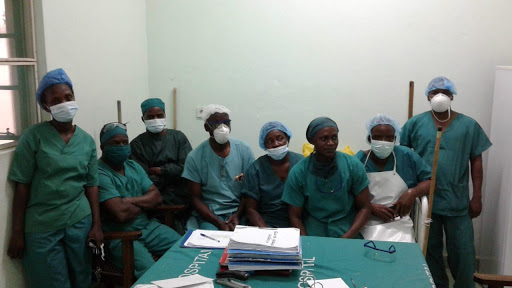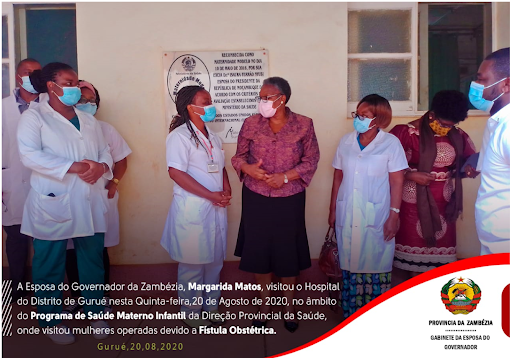By Assane Macangira (UNFPA Programme Coordinator - Zambézia)
“...When obstetric fistula surgeries restarted, I underwent surgery, and I am now cured. What makes me proud is that now I am healthy, and I have recovered [the] self-esteem that I had lost. I also recovered my job,” shares Calerda Eugénio Francisco, aged 26, from Gurue district in Zambezia province, who suffered from Obstetric Fistula, one of the most serious and tragic injuries that can occur during childbirth.
Following Mozambique’s first positive case of COVID-19 on 22 March, and the subsequent declaration of a state of emergency, the Ministry of Health (MoH) put in place regulations to curb the spread of the pandemic, including stopping all elective surgeries*. To limit the spread of contagion and ease the pressure on the health system, at that time, only emergency surgeries were allowed.
Once considered to be ‘non-essential’, girls and women that were on waiting lists for obstetric fistula (OF) repair surgeries saw their dreams of correcting their obstetric fistula postponed indefinitely. This exacerbated their pain and suffering, including discrimination from community members and relatives, sometimes even from their own husbands.
Calenda is one such example of a woman who suffered from the impacts of Obstetric Fistula, in addition to the discrimination she faced due to the disease itself, until she was able to receive the surgery during the COVID-19 pandemic in Mozambique.
Soon after she had [her] last baby, she noticed that she could not control her urine. “...I exuded a very bad smell, and people started to discriminate against me. Even my own husband abandoned me because of obstetric fistula.”
“My mother was the only one helping me to clean my clothes and go and fetch water for me. But when the other women from my community saw my mother washing my clothes and fetching water from the water wells, they also started to discriminate against her and [called] her names,” shares Calenda.

Obstetric fistula is an injury, which can be prevented and treated, which occurs during prolonged or obstructed childbirth without due and timely assistance from a qualified health professional, and leads to an opening between the vagina and the bladder and/or rectal canal. It is a serious public health issue in Mozambique, and one of the consequences of gender inequality, poverty, weak health services, premature marriages, early pregnancy and malnutrition. It is estimated that 2,500 new cases of fistula occur in the country, annually. This painful condition causes uncontrollable loss of urine and/or feces, which leaves the woman embarrassed and often leads to isolation from the community.
Cognizant of the suffering and discrimination faced by women and girls, UNFPA Mozambique, in partnership with its governmental and civil society partners, started to advocate for the resumption of elective obstetric fistula surgeries.
The momentum of this advocacy effort took place as Mozambique marked the International Day to End Obstetric Fistula (23 May 2020), under the theme: “End gender inequality! End health inequities! End Fistula now”! Among other activities, celebrations included radio and TV shows and debates, a live concert with 3 renowned musicians broadcasted live on Facebook, virtual trainings and talks facilitated by health professionals and a meeting with health authorities.
Never before has fistula received so much attention in Mozambique
This advocacy work led to two great changes: the MoH, via the Minister himself, committed to the achievement of 80% of surgeries for those needing fistula corrections in the coming years; and four days after the International Day, the MoH issued a circular to all provincial directorates of health, instructing them to, exceptionally, resume elective surgeries, only for obstetric fistula cases.
In Zambezia province, in addition to resuming fistula correction surgeries, local authorities increased their support to raise awareness about fistula, its prevention, treatment and social reintegration. If left untreated, fistula can become a chronic health issue, including the appearance of ulcers, kidney problems and damage of the nerves in the legs, as well as difficulties leading a normal life and maintaining gainful employment.
“We should have the obstetric fistula survivors telling their stories of overcoming fistula, so that they can sensitize other people in the same situation. They will shift from obstetric fistula survivors to influencers and change agents,” shared the Zambezia Governor’s wife, Margarida Matos, who has been leading advocacy efforts in the province, meeting with government authorities, community members and leaders and chairing the multi-sector task force on the matter.
Since the Government allowed for the resumption of fistula repair surgeries, 105 women in Zambezia province have received the surgery.
“The resumption of the OF repairs is important to alleviate a lot of suffering affecting adolescent girls and women with limited access to sexual and reproductive health services, mostly those from rural areas. These girls and women suffer from discrimination including from their relatives. After the resumption of fistula repair surgeries, 11 girls and women have already received surgeries in Mocuba district,” shared Armando Rafael, surgeon, and focal point for fistula surgeries in Mocuba, Zambézia
Rafael added that due to COVID-19, they have reinforced prevention measures including mask usage, awareness raising sessions, mandatory handwashing at the entrance of the health facility and surgery wards, pre-triage services before going to main consultation rooms, and other Ministry of Health guidelines.

As countries worldwide continue responding and struggling to cope with the pandemic, sexual and reproductive health services risk being sidelined. UNFPA will continue to support the Government to ensure that sexual and reproductive health services and support are available and accessible to women and girls, particularly the most vulnerable.
In conclusion, due to the positive impact that obstetric fistula corrections are having on vulnerable adolescent girls and young women in urban and rural Zambezia, UNFPA will continue to engage with different stakeholders to scale up these interventions in the province. Duty bearers will be engaged to increase their awareness raising initiatives about obstetric fistula so that many people are aware of this neglected but harmful disease; Additionally, obstetric fistula survivors will have their roles changed from victims to change agents as they will speak personally on this disease. Local partners and community leaders will play a critical role in mobilizing obstetric fistula patients and their families to promote institutional deliveries and resort to health facilities. Other UN agencies and donors will be mobilized to fund obstetric fistula projects and programmes.
*Contrary to an emergency surgery which is performed for urgent medical conditions (life-threatening cause), an elective surgery can be scheduled in advance. It may be a surgery you choose to have for a better quality of life, but not for a life-threatening condition.
Source: https://www.hopkinsmedicine.org/health/treatment-tests-and-therapies/types-of-surgery
With funding from the Government of Canada, UNFPA supports the Government of Mozambique to improve the well-being of girls and women living with fistula by educating communities about the condition, increasing national capacity for its treatment and referrals for routine-based care, plus promoting agency among cured girls and women to support their re-integration into society.



